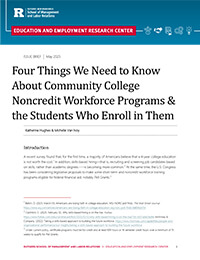More learners in a hurry to advance favor workforce programs
By Eliza Peterson, Katherine Hughes, Michelle Van Noy, and Wendy Sedlak
Americans eager to gain new skills and energize their careers quickly and inexpensively are turning to increasingly popular short-term workforce programs.
More than 3.2 million learners earned undergraduate certificates in the 2023-24 school year, an 11 percent jump over the previous year. Nearly three out of four adults without degrees say that industry certifications are “very” or “extremely” valuable.
But what really motivates adults to enroll? Are they choosing the right programs?
A new study by the Rutgers Education and Employment Research Center (EERC), funded by Lumina Foundation, digs into those questions. Through in-depth interviews with more than 50 students aged 18 to 56 at three community colleges—LaGuardia Community College in New York, Mt. San Antonio College in California, and Northern Virginia Community College—the research team is exploring the personal stories and goals shaping students’ choices.
Here are some of the early themes emerging:
Multidirectional pathways are the norm.
Many students don’t follow a traditional college timeline. Some take short-term credit courses back-to-back, others mix those with credit programs, and quite a few have started and stopped college several times.
“If I can get some quick knowledge and get my foot in the door, I hit the ground running, but to go to school for two years or four years for a degree, I just never see the end of it, and I get impatient. I’ve dropped out so many times,” said a 49-year-old Northern Virginia Community College human resources student.
Speed and cost matter.
Students are drawn to short-term programs that are affordable and can be completed quickly—key factors for balancing work, family, and other responsibilities.
“[I chose this course because] I was… able to get the scholarships and the funding to do it,” said another North Virginia human resources student, 32.
Challenges shape the journey.
Some students say they’ve faced huge barriers to education, including physical or learning disabilities (like hearing loss or ADHD) and personal stress, such as teen pregnancy or time in foster care.
“I went to DeVry University, and unfortunately, I dropped out. I was facing hearing issues… My hearing has impacted my ability to continue education the way I wish,” said a 37-year-old pharmacy technician student at LaGuardia Community College.
Career clarity varies.
Many students might not have had the chance to meet with a college advisor and lack a clear view of what their studies might lead to in the job market.
“I have my CNA license, my EKG license, my phlebotomy license, my food handling license, and this license here as a central sterile technician, and then I’m going for my pharmacy tech. So, if I would have just figured out what I wanted to do—that’s about six years of school, and I could have been a doctor already. Could have been a pharmacist,” said a 43-year-old woman in LaGuardia’s pharmacy technician program.
A valuable glimpse
We’ll learn more as we interview a total of 90 community college students by year’s end. But these early findings offer valuable insights into an underexplored world: the motivations, realities, and aspirations of students in short-term workforce programs. While their success doesn’t always follow a straight line or easy path, they are seeking to build better lives through the power of learning.
[Eliza Peterson is a researcher at Rutgers’ Education and Employment Research Center (EERC). Katherine Hughes, Ph.D., is principal at EdWordian and an EERC research affiliate. Michelle Van Noy, Ph.D., is the EERC’s director and associate research professor. Wendy Sedlak, Ph.D., is strategy director for research and evaluation at Lumina Foundation.]


